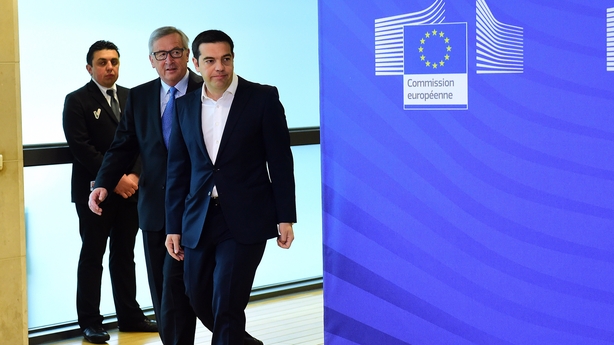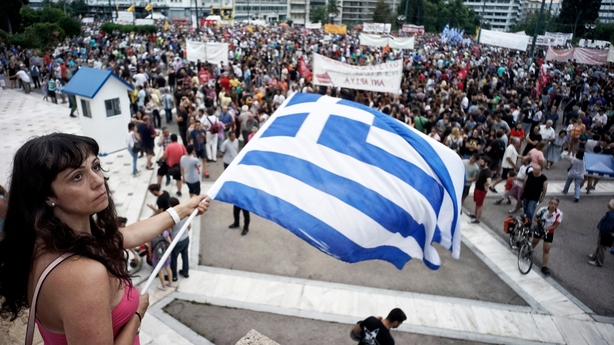Eurozone finance ministers will meet again on Wednesday in a bid to reach a final bailout deal for Greece ahead of an EU leaders' summit the following day, EU President Donald Tusk has said.
"Prime Minister (Alexis) Tsipras and the institutions will work together now so that the Eurogroup can achieve results on Wednesday evening that can be presented Thursday morning," Mr Tusk told a press conference after an emergency eurozone summit in Brussels Monday.
French President Francois Hollande said the EU and creditors were making progress with Greece on a debt bailout accord.
"We are moving towards an accord," Mr Hollande told reporters after the emergency summit on Greece.
"There is still work to be done ... every effort must be made so that when eurozone finance ministers meet Wednesday, a solution is in sight," he added.
German Chancellor Angela Merkel, whose country is Greece's biggest creditor, was more cautious.
"I can't give any guarantee that that will happen," she said of a final agreement. "There's still a lot of work to be done."
The Greek proposals include higher taxes and welfare charges and steps to curtail early retirement, but not the nominal pension and wage cuts first sought by lenders.
Mr Tsipras, elected in January on a promise to end austerity measures, also appeared to have avoided raising value added tax on electricity or loosening job protection laws.
The Eurogroup of finance ministers from the 19-country currency union had met earlier ahead of the crisis summit, but was unable to reach any deal on a new reform plan submitted by Greece overnight.
European Commission chief Jean-Claude Juncker meanwhile said he was "convinced" a final agreement would be made this week between Greece and its EU-IMF creditors after a five-month stand-off.
"I'm convinced that we will come to a final agreement in the course of this week, for the simple reason that we have to find an agreement this week," Mr Juncker said.
Greece has had to accept harsh austerity measures in return for bailout funds but the left-wing government of Mr Tsipras elected in January has balked at taking more of the harsh measures in return for the last tranche of €7.2bn from the current programme, which expires at the end of the month.
Without the money, Greece may not be able to make a €1.5bn repayment to the IMF, which is also due on 30 June, risking a default and possible chaotic exit from the eurozone.
Earlier, Taoiseach Enda Kenny described the latest proposal from Greece to its EU-IMF creditors as "the basis for a discussion".
Arriving at the emergency summit, Mr Kenny said there was evidence that Greece had shown flexibility on the key sticking points which have remained deadlocked between both sides.
Those points include pensions, VAT, and the country's primary budget surplus - the budget position after interest has been paid on loans.
Mr Kenny said: "The important thing is that there be a conclusion to this set of negotiations this week."
The Taoiseach said the continued instability had caused problems for the Greek people.
"I'm happy to say there's some movement [from Greece] and it's the start of a more detailed process now," he said.
Eurozone officials earlier welcomed Greek concessions as a possible step towards a deal on averting a default.
However, politicians dismissed expectations of a breakthrough at a summit tonight to secure the country's future in the euro.
Hopes rose on financial markets as the officials accepted the reform proposal for the first time as a "reasonable" basis for negotiating an aid-for-reforms agreement between Greece and its creditors at the EU and IMF.
But Germany, the biggest European contributor to Greece's bailout programmes, warned that the meeting in Brussels of eurozone leaders could be only "a summit of consultations" without a detailed technical agreement.
Chancellor Angela Merkel signalled that any settlement could take days to reach.
Her finance minister, Wolfgang Schaeuble, said he had seen nothing new from Greece, even though Greece faces a €1.6bn repayment to the IMF on 30 June.
It will probably not be able to make the repayment without help from its creditors.
After months of acrimony, accusations and negotiations between Greece and its creditors, positive mood music in Brussels injected new hope that a long-awaited aid agreement might be near.
European shares surged and the Greek stock market jumped nearly 7% while the borrowing costs of Italy, Spain and Portugal - the countries most likely to be hit if Greece headed for the euro zone exit - fell sharply.
In the proposal sent early this morning, Greece moved to acquiesce to lenders' demands for tax increases and pension reform by offering to raise the Greek retirement age gradually to 67 and curb early retirements.
It also offered to reform the value-added-tax system to set the main rate at 23%.
"This is now, for the first time, a reasonable paper on which you can have an informed and productive discussion," one eurozone official said. "I cannot predict it will lead to an agreement tonight, but it is what was expected in form and in substance from such a paper," the official said.
Greek Prime Minister Alexis Tsipras headed into a series of talks with figures including European Central Bank President Mario Draghi and IMF head Christine Lagarde before the summit which is due to start at 6pm Irish time.
 European Commission President Jean-Claude Juncker, a veteran EU dealmaker, gave Mr Tsipras a warm welcome after he arrived in Brussels, taking him by the shoulders and patting him on the cheek.
European Commission President Jean-Claude Juncker, a veteran EU dealmaker, gave Mr Tsipras a warm welcome after he arrived in Brussels, taking him by the shoulders and patting him on the cheek.
This contrasted to earlier this month, when a frustrated Mr Juncker rebuked Mr Tsipras for failing to observe the "minimum rules" of friendship.
Ms Merkel held open the possibility of a deal. "There are still a lot of days in the week in which decisions can be taken," she told reporters in the eastern German city of Magdeburg.
But Mr Schaeuble, who has taken a consistently hard line with Greece, was pessimistic.
"There is nothing new beyond many trying to create expectations which are not supported by substance," he said.
"Without substantial proposals which can be examined seriously, we can't seriously prepare a euro summit."
Other European ministers played down the prospect of an agreement at the summit, saying there was too little time for officials to examine the proposal.
"There is always time, there is the will for a good agreement. Today an agreement is not possible," said Spanish Economy Minister Luis de Guindos.
"We still need to analyse many details. There are many versions of the Greek proposal. I don't know which is the definitive one."
However, EU Economic Commissioner Pierre Moscovici said he was "convinced" that eurozone leaders would find a resolution on the basis of the latest proposal.
"If we get a deal tonight, that would be better, but if not, we'll need to set the foundation tonight so that a deal can be reached in coming days," French President Francois Hollande said in Paris before he was due to travel to the summit.
Underlining the urgent need for a deal on Monday, Greece's central bank last week warned lenders to brace for a "difficult day" tomorrow if the summit ended without a breakthrough, banking sources have said.
 The country could be forced to impose capital controls within days to stem the outflow of billions of euros from banks by savers fearing they could be stuck with a sharply devalued new currency should Greece be forced out of the euro.
The country could be forced to impose capital controls within days to stem the outflow of billions of euros from banks by savers fearing they could be stuck with a sharply devalued new currency should Greece be forced out of the euro.
There were no immediate long queues or signs of panic outside Greek banks in the capital this morning.
Meanwhile the European Central Bank has raised the ceiling on emergency liquidity for Greek banks for the third time in six days and a senior ECB policymaker said any further extension would depend on how talks with creditors progress.
A banking source said the euro zone central bank's governing council had held a teleconference to discuss extending the emergency liquidity assistance after savers pulled about €4.2 billion from Greek lenders last week.
"The governing council raised the ELA cap and will convene again via teleconference at any time necessary," the source said, speaking on condition of anonymity and declining to say how much the ceiling had been raised by.
Greece's proposals target VAT, pensions, taxes - reports
Greece's latest proposals to reach a debt deal with its creditors are focused on VAT rates, early retirement measures and tax increases, which aim to cover a good part of the country's budgetary gap, Greek press have reported today.
A European source in Brussels told AFP that the Greeks have made proposals on pensions and defence spending, with some "movement" on VAT still needed.
The proposed adjustments to VAT could bring some €2 billion in additional revenue to state coffers, likewise for the proposals on pensions, the financial daily Neftemporiki reported.
Several newspapers, including Ta Nea and Ethnos, said that Greece would be prepared to raise the VAT on hotel stays - a key rate for tourism - from 6.5% to 13%, while raising the VAT on restaurants from 13% to 23% has not been resolved.
At the same time Greece has maintained the 13% VAT rate on electricity, a "red line" for the anti-austerity government.
Athens has also accepted to impose the lowest VAT rate of 6% only on medicines, books and theatre tickets.
On pensions, eliminating early retirement would begin in 2016, rather than progressively.
More tax hikes, after five years of raising rates, have also been proposed for business profits about €500,000, instead €1m as originally planned, and incomes over €30,000.
As in all previous proposals, there are measures to improve the collection of VAT and taxes, and to fight against corruption.
Greek debt 'unsustainable'
Meanwhile, Karl Whelan, professor of economics at University College Dublin, has said it is likely that agreement will be reached today between Greece and its creditors.
However, he said the deal would have strict conditions that would have to be met by Greece.
If those conditions were not met, he said we could see further crisis negotiations in three-six months.
Mr Whelan said he believed it was possible that Greece could eventually leave the euro, but he said this outcome would be a failure of diplomacy, with losses on both sides.
He said that while the consequences could not be known at this stage, they would be far-reaching.
The economist said the amount of debt owed by Greece was unsustainable, and would never be paid off.
He said that at some point it will become politically possible for European leaders to reach an agreement which would allow Greece to function again economically.

